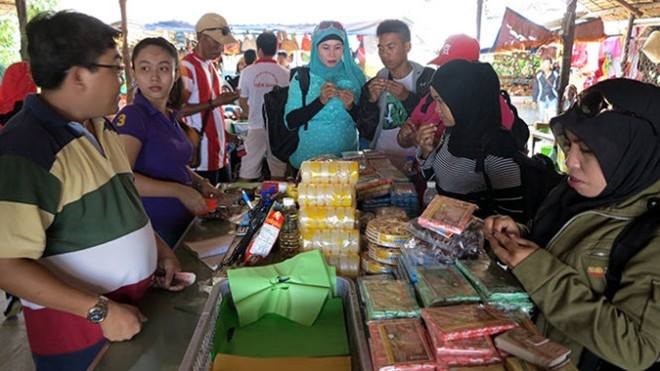 Society
Society

Việt Nam and Indonesia should put more efforts into strengthening their strategic co-operation to face challenges posed by the shifting geopolitical nature of the Asia-Pacific, according to speakers at a conference in Hà Nội yesterday.
 |
| Need to co-operate: Indonesian tourists in Việt Nam are part of the existing relationship. — VNA/VNS Photo |
HÀ NỘI — Việt Nam and Indonesia should put more efforts into strengthening their strategic co-operation to face challenges posed by the shifting geopolitical nature of the Asia-Pacific, according to speakers at a conference in Hà Nội yesterday.
Experts in international relations, national defence, and economic and cultural studies gathered to discuss the role of regional organisations in promoting Indonesia-Việt Nam ties.
The conference was held in relation to a chain of major regional events in which both countries played a part, namely the Asia Pacific Economic Cooperation (APEC) Summit in Đà Nẵng City in November, the fiftieth anniversary of ASEAN in the Philippines in August, and Party Secretary General Nguyễn Phú Trọng’s visit to Indonesia in April.
Regional co-operative structures, such as ASEAN, APEC and the Asia-Europe Meeting (ASEM), have been playing a great role in promoting regional development between their member countries, said former Indonesian Ambassador to the United States, Soemadi Djoko Moerdjono Brotodiningrat.
However, these structures, especially ASEAN, were facing great challenges posed by the engagement of the world’s major powers in the region, namely the Indo-Pacific strategy that the United States and Japan aim to pursue, the surge of protectionism in the US, and China’s “One Belt, One Road” initiative, he said.
“In this shifting geopolitical context, new ways of maintaining stability of the Southeast Asian region need to be examined,” Soemadi said.
“ASEAN should focus on maintaining its centrality. This is considered important, not as a Southeast Asian issue but to ensure that regional co-operation will not be dominated only by the most powerful,” he added.
"ASEAN must also ensure the activities of its economic community by maintaining “open regionalism”, one of ASEAN’s basic principles, he added. This is the principle that affects all ASEAN policies, which are geared towards establishing partnerships of different parties, the freedom to control bilateral trade agreements, and to participate in most ASEAN economic cooperation," he said.
The strategic co-operation between Việt Nam and Indonesia needed to be strengthened as both countries have a critical geographic position in the region, said Associate Professor Trần Khánh from the Institute of Southeast Asia Studies under the Việt Nam Academy of Social Sciences (VASS).
While Indonesia is considered as a bridge between the Indian Ocean and Pacific Ocean, Việt Nam can be considered as a link between the seas and mainland, he said.
“Both countries should be highly aware of these critical positions in relation to the global context,” he added.
"More actions should be implemented to actualise the strategic partnership relations that the two countries agreed to establish in 2011, especially when pressure from political competitions, protectionism and national interests between the two is becoming increasingly immense," he said.
"The two countries have not fully harnessed their potential to collaborate," said Nguyễn Đặng Tiến, chairman of the Việt Nam-Indonesia Friendship Association (VIFA). Indonesia has only invested in 59 projects worth US$437 million in Việt Nam by April 2017, and Việt Nam has seven projects worth $107 million in Indonesia," he added.
Tiến said difficulties in investment policies and customs should be solved to facilitate economic collaboration between the two countries. Social, cultural exchanges and human resources collaboration should also be facilitated.
Nguyễn Đăng Quang, former Vietnamese Ambassador to Indonesia, said that there was an inter-relation between the power of regional structures like ASEAN and the bilateral relations between their members.
“Indonesia and Việt Nam are both important factors of ASEAN,” he said. “The power and unity of ASEAN will be elevated if the bilateral relation between the two countries is strengthened.”
New issues will emerge in the two countries’ bilateral relation as the results of the US and China’s new strategies and initiatives, he added.
“We need to foresee the impacts of these new ideas, not only the challenges but also the opportunities,” he said. — VNS




